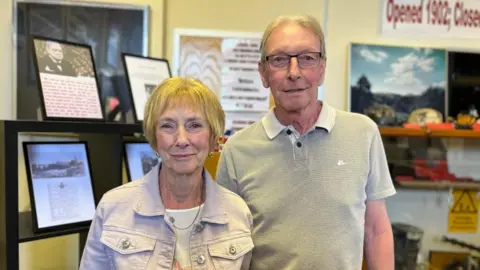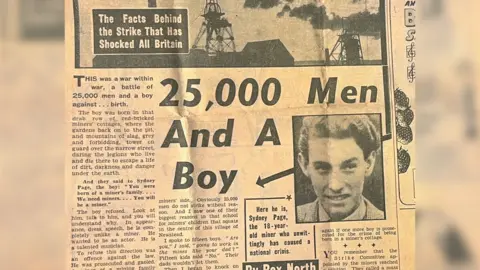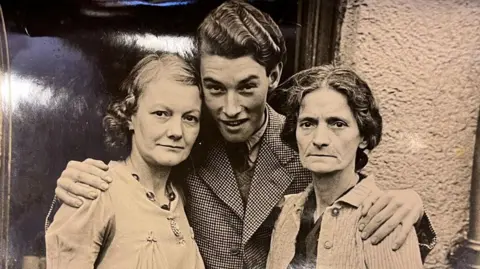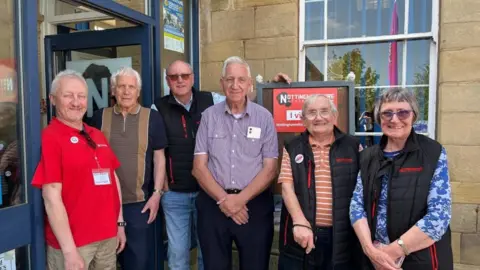'Our dad was arrested for wanting to fight in WW2'
 BBC
BBCThe descendants of a pit miner arrested for wanting to join the armed forces in World War Two have shared their memories to a museum ahead of VE day.
Walter Sydney Page - known as Sydney - worked at Newstead colliery in Nottinghamshire until his retirement in 1984.
During the war he aspired to join the navy but by the time he came of age mining had become a "reserved occupation" which prevented those employed from leaving.
However, the 18-year-old stood firm in his desire to enlist and was sacked and subsequently sentenced to 30 days in Lincoln Prison in 1943.
Further details of what happened to Sydney during his ordeal have now been revealed by his son Dennis Page and Jennifer Thornley.
 Family handout
Family handout'Nobody could visit'
Historical records say thousands of miners went on strike on 13 September 1943 in response to Sydney's imprisonment, which "brought the whole of the Nottingham coalfield to a standstill".
However, this would have been completely unknown to the teenager, according to Mrs Thornley.
"We were told that when he was in prison, he was poorly with gastroenteritis, but he wasn't allowed a doctor and he wasn't allowed any news," she said.
"He didn't know that the coalfield had come out on strike for him at all."
Dennis Page added that he eventually caved to pressure from the authorities and agreed to return to work because he believed he was on his own.
 Family handout
Family handoutThe strike on behalf of Sydney came to an end after the government met demands to stop further prosecutions and pardon the young miner, according to a museum report.
He ended up serving only eight days in prison and returned to work at Newstead colliery for the rest of his working life.
Mrs Thornley and Mr Page say their father rarely spoke about the situation he faced, likely due to a sense of shame.
"He always felt his brother-in-laws had all been to war and he always felt, not belittled, but as though [he hadn't done his duty]," Mrs Thornley said.
'Kind and generous'
Mr Page died in 2013 at the age of 88. His children described him as community-spirited and generous, despite a difficult upbringing which saw him raised by his grandmother.
"I think my dad was a popular man, I never heard anybody say anything bad about him," Mrs Thornley said. "We're proud of him."
"He ought to have accepted it more than hiding it away, which is basically what he did," Dennis Page added.

Sydney's story will now be on display in an exhibition at the Nottinghamshire Mining Museum in Mansfield.
Ann Donlan, from the museum, said: "People don't know about the sacrifice that miners and their families made in the war because it was a reserved occupation."
She added that the visit by Dennis Page and Jennifer Thornley had allowed the museum to learn "a lot more" than it knew before.
The museum said 293 miners died in Nottinghamshire collieries during the war, equivalent to a death every week.
"We're about honouring the sacrifices of the mining community, but also the tremendous achievements of the mining community," she said.
Follow BBC Nottingham on Facebook, on X, or on Instagram. Send your story ideas to [email protected] or via WhatsApp on 0808 100 2210.
